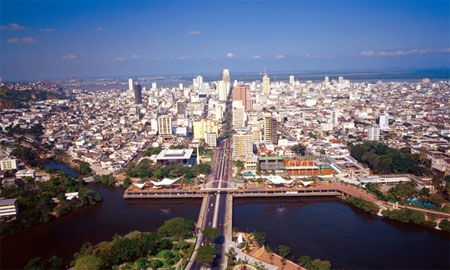Never has a statement been more apt than when referring to the city of
Quayaquil in Ecuador, which has evolved to become one of the most important emerging cities in South America, and is poised for further growth and increased strategic regional influence.
Larger than Quito, the capital of Ecuador, Guayaquil is among the fastest-growing cities in South America, with a population of more than three million in the metropolitan area, indicative of a growth rate of nearly 12% over the past five years. It is making giant strides towards becoming a major commercial hub for the whole Latin American region: Ecuador is the world's largest banana exporter, and a major producer of shrimp and canned fish, principally tuna. Much of the wealth derived from these activities passes through Guayaquil – the principal port for the country.
In contrast to the rest of the country, which has often been hamstrung by power struggles and public suspicion of modern business practices, Guayaquil has a relentlessly upbeat and open attitude to commerce. While many might say “Live and let live,” Guayaquil and its current major Jaime Nebot prefer to say “Work and let work.” Being a port city, it is acutely aware of the value of free trade and free enterprise.
“IN THE STRUGGLE FOR SURVIVAL, THE FITTEST WINS OUT AT THE EXPENSE OF THEIR RIVALS BECAUSE THEY SUCCEED IN ADAPTING THEMSELVES BEST TO THEIR ENVIRONMENT.”
CHARLES DARWIN
|
Mayor Nebot is a staunch supporter of free enterprise, never afraid to air his deeply held beliefs. “It’s only possible to attract investment through stimulation and trust. In Guayaquil we are easy going with investment; we don’t tell the investor what to do, but we stand by in the development of their business.”
He continues: “The State must guarantee legal certainty, and cannot change the rules of the game every day to its benefit and to the detriment of the investor. The state has to guarantee and protect competition and improve competitiveness; for that the state must encourage production. The state must abandon any restrictive practice to this competitiveness. The state must guarantee access to markets.”
An example of the strength, resilience and confidence of the business environment in Guayaquil is provided by the UK’s Investment and Foreign Commerce Office for Latin America Director, Tony Lamb, who said recently in his
visit to Ecuador that they had identified the biggest investment opportunities as being in Guayaquil. After talking with UK’s investors present in the country, the company are moving part of their human resources to Guayaquil.
Defending the city’s autonomy, Mayor Nebot has said: “Guayaquil will never give up the right to the freedom to decide, the fairness to receive or the creativity to progress.”
Nebot’s philosophy is paying dividends. In recent years, Guayaquil has been recognised by the UN as a model for urban development, thanks to the innovative urban renewal projects which have restored many of its historical neighborhoods, parks, avenues and squares, as well as its transportation system and port.
Since his election in 2000, Mayor Nebot has spearheaded many campaigns to attract tourists and put his city on the international map. One of his projects, the magnificent Malecon 2000 promenade, also known as the Simon Bolivar Boardwalk, stretches for two miles along the waterfront, and boasts both a convivial daytime atmosphere and a vibrant nightlife scene. Restaurants and shops are interspersed with gardens, monuments, public art, and play areas, anchored by a theatre complex and a world-class museum. Beautiful old barrios, or neighbourhoods, have been carefully restored to preserve their charm; Las Penas, for example, has a rich artistic heritage reflected in its scores of art galleries.
Street lighting, public safety and transportation have also been improved. In August 2006, the city's first rapid transit system, Metrovia, opened to provide a quicker, high-capacity service for locals and tourist alike. The city has also seen the construction of a new terminal at the José Joaquín de Olmedo International Airport at a cost of $70 million – an investment which has seen the airport attract numerous accolades for being one of the best of its kind in the world.
| “IF YOU DEFINE SUCCESS AS THE ABILITY TO MAKE DREAMS COME TRUE, THAT IS WHAT WE DO IN GUAYAQUIL” |
Mayor Nebot´s and his administration are also responsible for the “future” Daular airport, destined to be in operation between 2017 and 2021, just as the JJ Olmedo airport reaches the limits of its operating capacity. The new airport will have three simultaneous landing lanes built to handle the word’s largest aircraft (only six other airports in the world, all of them in the United States, can boast this feature.
Meanwhile, Guayaquil’s port, is already one of the busiest in the region, and has been the subject of major expansion and continued investment. Along with the airports, it is regarded as a catalyst for further growth. The transport link are naturally fundamental to Guayaquil’s position in the global market, as summarised by Mayor Nebot’s pragmatic attitudes.
“You cannot ignore or pretend that globalization does not exist – it is there, beyond good or bad. It is there, and what you have to do is have the ability to reap its benefits ,and minimize its disadvantages.”
But between its geographic location, infrastructure, fiercely independent mindset and dynamic work ethic, there seems to be little to prevent Guayaquil from succeeding in its dream of becoming Latin America’s main commercial hub.

0 COMMENTS